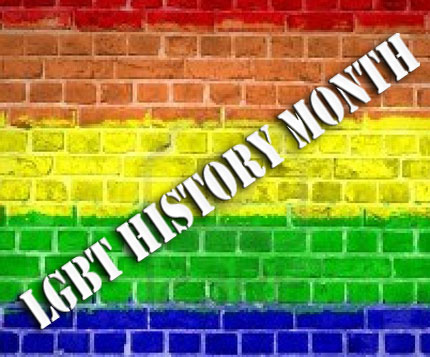How they view our realities and what they’re doing to move the struggles forward
By: Nicole Lashomb/TRT Editor-in-Chief—
The Rainbow Times asked questions to many LGBTQ leaders in New England pertaining to LGBTQ History Month and other relevant topics within the LGBT community. The responses are candid and contemplative, wise and informative. Their thoughts and concern about the LGBT community clearly reflect the work that they do and their personal struggles. Most importantly, their views show the intersectionality amongst our own members and the depth of the work ahead. Marriage equality is not the end of LGBTQ rights, it is only the beginning of fighting for the struggles of the poor, the old, the young, women, children, immigrants and even those who are American, but still considered “second class citizens” due to race or ethnicity.
The community leaders who answered the questions mirror exactly the social, cultural and socioeconomic diversity that we find amongst ourselves. Those who kindly offered their time to reflect during this LGBTQ History month are: Kara Coredini, Executive Director, MassEquality; Mason J. Dunn, Executive Director, Massachusetts Transgender Political Coalition; Lee Swislow, Executive Director, Gay & Lesbian Advocates & Defenders (GLAD); Erica Kay-Webster, Founding Board Chair/President, Foundation For International Justice and the Executive Director of The Promise Place School for homeless LGBT youth; Keri Aulita, Sales Agent, William Raveis Real Estate, former Boston Pride Deputy Director; and Unid@s: The National LGBT Latin@ Organization, Board Member, former Boston Pride Board member.
The Rainbow Times: Do you celebrate LGBT History Month?
Lee Swislow: Our community has such a rich history to celebrate and to learn from. GLAD strives to honor that history, and mark our contributions to it, year-round.
For instance, in July we marked the 15th anniversary of the U.S. Supreme Court’s ruling in our lawsuit Bragdon v. Abbott, which held that people with HIV are protected from discrimination under the Americans With Disabilities Act. The case established critical protections for people living with HIV and marked the first time the Supreme Court addressed the issue of HIV/AIDS.
In November we will celebrate the 10th anniversary of the Massachusetts Supreme Judicial Court’s ruling in our Goodridge v. Department of Public Health lawsuit, which made Massachusetts the first U.S. state to have marriage equality. GLAD will also celebrate that landmark decision on October 25, when we honor former SJC Chief Justice Margaret Marshall, author of the Goodridge decision, at our annual Spirit of Justice Award Dinner.
Kara Coredini: MassEquality recognizes LGBT History Month. It’s incredibly important to recognize where we have been in order to get where we want to be. It is incredible but even in the short 10 years in which we have been joyfully celebrating the right to marry, history is being lost. People forget that we won that right through a ruling by the Massachusetts Supreme Judicial Court and how it immediately came under political attack. It was not easy to protect the Goodridge ruling, but we did it and now we’re moving on to other important issues such as public accommodations protections for transgender residents of the state; resources for homeless LGBTQ youth; and culturally competent care for LGBTQ elders.
Keri Aulita: I usually don’t “celebrate” LGBT History Month, per say, but I’m definitely more contemplative on our journey and progress a bit more. Between National Coming Out Day and the anniversary of the death of Matthew Shepard, there are many things to be thoughtful about in October. Of course, I do hope that we’re all reflecting, celebrating, and working for change during the other 11 months too.
Mason J. Dunn: I do. LGBTQ History is an important reminder of where we, as a community, have been, and who helped to get us there. It’s also important to differentiate between Pride Month (June) and History Month (October): Pride month is about the here and now, and celebrating the current state of the LGBTQ community. History Month, conversely, is about celebrating those who have worked to move our community forward.
Wilfred Labiosa: Yes, because as people who are Latino and LGBT we must celebrate our roots, our history, and culture. We are part of the LGBT diaspora and hence we should be proud to teach others of the diversity found among the LGBT community, as Latinos.
Erica Kay-Webster: Yes we celebrate LGBT History Month. As a Veteran of the Stonewall Rebellion of 1969 I have lived through almost 45 years as a transgender woman. I remember when we were beaten and arrested by the police. In 1969 it was illegal to be gay, lesbian, bisexual, or transgender and it was illegal for a bar to serve us alcohol. When we were arrested our names and photo’s would be published in the morning newspaper. Once that happened it started a chain of events; we were fired from our jobs, evicted from our apartments, and disowned by our families. We lived in constant fear of all sorts of attacks and abuse and could not turn to the police for protection. There were many in our community that chose suicide rather than to be exposed as LGBT. In those days you had to hide in a deep, dark closet and you were very lucky if you could get a job. Many of us were homeless and went hungry for days on end.
Since that night and the following days of our rebellion on June 28, 1969 I have witnessed great strides towards equality. That was the night of the birth of our movement which has now grown to a place where we are finally seeing the light at the end of the tunnel. For me personally it is a time to celebrate our victories and to honor all of the brave souls that have given their lives to gain our freedom. There are too many to count. Their lives were not given in vain and the work they began were the seeds of equality they planted which we continue to fertilize and water with our presence and celebrations every year in our country and abroad.
TRT: What does it mean to you to have LGBT History Month?
Keri Aulita: I certainly don’t want to sound ungrateful for the national recognition and the local events and activities that take place, because they’re important and they draw attention to the needs, successes and issues facing our community. But there are also celebratory months for Star Wars, Pigs and Orgasms (None of which I have anything against!). It seems like there’s a day, week, or month for just about everything under the sun, so I guess how we make it count is what matters, what we do with our 30 days in the spotlight.
Mason J. Dunn: Personally, it’s a reminder of our community history, and, in some cases, learn something new about our history. It’s about celebration and education.
Erica Kay-Webster: For me personally it is vitally important to have LGBT History Month. As I travel and speak to youth groups I am disappointed to learn that so many of our youth have no idea of what it was like for us before the rebellion at the Stonewall Inn and that the majority know so little of our history. Although there have been many historical and memorable moments since that night it is crucial that all LGBT youth learn about the entire history of our movement for acceptance and full equal rights. I look forward to the day that LGBT History is taught in all schools much the same way that Black History is now taught.
Lee Swislow: LGBT History Month is an important vehicle to educate our community and the general public about the history of our movement and the unique contributions LGBT people have made to our society across many generations. I think it gives a tremendous boost in visibility to the LGBT community, which is critical to winning support for our full social and legal equality.
Wilfred Labiosa: It means that everyone’s history is important and that it is a moment when we all can learn about the richness of our community.
Kara Coredini: Celebrating our history means celebrating our existence. It means those that came before us mattered.
TRT: National Coming Out Day is October 11th. What message do you have for those who haven’t come out yet?
Wilfred Labiosa: This shouldn’t be a day instead we should be talking about this issue throughout the year. To all of those who struggle about finding their own identity and self-acceptance, you are not alone. There are many in the LGBT community who had the same struggles like you. Don’t give up, it gets better!
Lee Swislow: As I stated above, LGBT visibility is critical to winning support for our full equality. When people come to know us as LGBT family members, friends, co-workers, neighbors, coaches, etc., and see that our lives don’t differ much from theirs, the need for our fair treatment becomes obvious. So coming out is one of the most important acts we can do as LGBT people.
That said, the decision to come out is highly personal and should be left to the individual. For many people coming out puts them at risk of violence, homelessness, unemployment, the loss of family relationships and worse. No one should be outed against their will.
Kara Coredini: We like to think that because we enjoy the right to marry in Massachusetts that coming out is easy. It’s not. It still takes courage. We would simply like to say to a young person struggling with coming out, or even an older person, that we understand that it can be difficult. But we encourage you to do it when you can do so safely. Nothing compares to being able to live authentically.
Erica Kay-Webster: On National Coming Out Day on October 11th I would like to let those coming out know that we know it’s not easy and that many of them fear rejection, but in living life as their authentic selves they will bring an entire new perspective to their lives. We are living in a new era, a time when we have great allies, wonderful support groups, and many friends in political office that are fighting this fight with us. We are no longer alone in our struggles. As an historical transgender woman I say, look at where I am today at 63 years old. I am proud and honored to have the respect and support of not only our community but thousands in the straight community. Life may not always be easy but if I could survive and flourish so can they. Stand tall, Stand proud, and use every resource available to you.
Keri Aulita: I hesitate to regurgitate any sort of “Don’t worry. Be Yourself. It’ll Be Fine.” mantra because unfortunately for many people it’s not that easy, simple, or without consequence. I guess, then, the best message I can send to someone who hasn’t come out yet and who wants to is to find that one person or organization or group that can help you through it. You don’t have to do it alone. And for those who haven’t come out yet and who may not want to, I say…In time, I hope you can realize your own self-worth and find peace and strength enough to want to share your full gorgeousness with the world!
Mason J. Dunn: Coming out can be a difficult and intimidating process. Just remember it is a process, and wherever you are in that journey is okay – when you are ready to come out, you have a community of supporters and allies ready to lift you up and celebrate you AND your identity.
TRT: What is the most pressing issue in the LGBT community nowadays? (Trans, LGBTQ youth, gay equal rights, gay marriage, bullying, trans equal employment, etc.)
Mason J. Dunn: For me, trans rights are a massive priority in Massachusetts and across the country. Discrimination against trans people is a reality that MTPC is working to end. Additionally, I think the intersection of identities and issues are important to address: immigration reform, health care access, institutional racism and beyond. These matters impact the LGBTQ community, and we must work together to fight oppression in all forms.
Keri Aulita: Oh goodness, how much time do we have? How much space is available in the paper? I’ve always found it difficult to prioritize what aspects of equality are most important. Aren’t they all? But I believe we have to take care of the most basic of our human needs first … food, shelter, medical care, safety from violence. I mean marriage is important and it’s our right, but I’ve often wondered why millions of dollars were pumped into that cause instead of getting our homeless LGBTQ teens off the streets or working toward ending the savage, hateful violence that ravages our community. I guess we wage one battle at a time and hope they all end in victories.
Wilfred Labiosa: The issues that we should work on as a community should be immigration reform inclusive of all, the increase of homeless LGBTQ youth and young adults, and the everyday hate crimes and bullying.
Lee Swislow: There are many pressing issues in the LGBT community so I am loath to identify just one. Looking at the big picture, our community needs to continue our push for laws and policies to ensure that we are treated equally, fairly and with dignity in all areas of life: trans kids deserve access to school programs and facilities that match their gender identities, LGBT workers need protections from job discrimination, our elders need quality, culturally competent services as they age; people with HIV need access to appropriate health care. GLAD is doing its part by focusing our resources and expertise in several of these areas. To give but two examples: through our Transgender Rights Project and our Youth Initiative, we have litigated and done policy work aimed at ensuring transgender youth in New England are respected and treated fairly at school, and our AIDS Law Project is spearheading legislation to insure that people suffering from HIV-related lipodystrophy can access treatment for their condition.
Erica Kay-Webster: I believe the time has come to push for a fully inclusive equal rights act, much like that which President Lyndon Johnson signed into law in 1964. This would make us a protected class of citizen under US law. Once that law is on the books no State can pass any law which would discriminate against a protected class of citizen. Until that time comes we continue to fight for one state at a time and one piece of legislation at a time. With the full protection of US Law all States, Cities, and Counties would have to obey the law of the land and provide equal protection of the Law to all of its citizens which would include the LGBT population in our country. This would also include marriage, public accommodations, anti-bullying laws, housing, and equal employment.
Kara Coredini: In Massachusetts, the most pressing issue is getting public accommodations protections for transgender residents. Beyond that, it is the business of making our state the safest and most supportive place in which to live if you are LGBTQ.
For more information on a variety of issues that affect the LGBT community visit the following sites:
Unid@s the National LGBT Latin@ Organization
Foundation For International Justice
Massachusetts Commission on LGBT Youth
For other resources (all kinds) visit TRT’s Resource Page. If you would like your non-profit resource included, fill out our contact form with a brief description of your organization’s mission and contact information.








